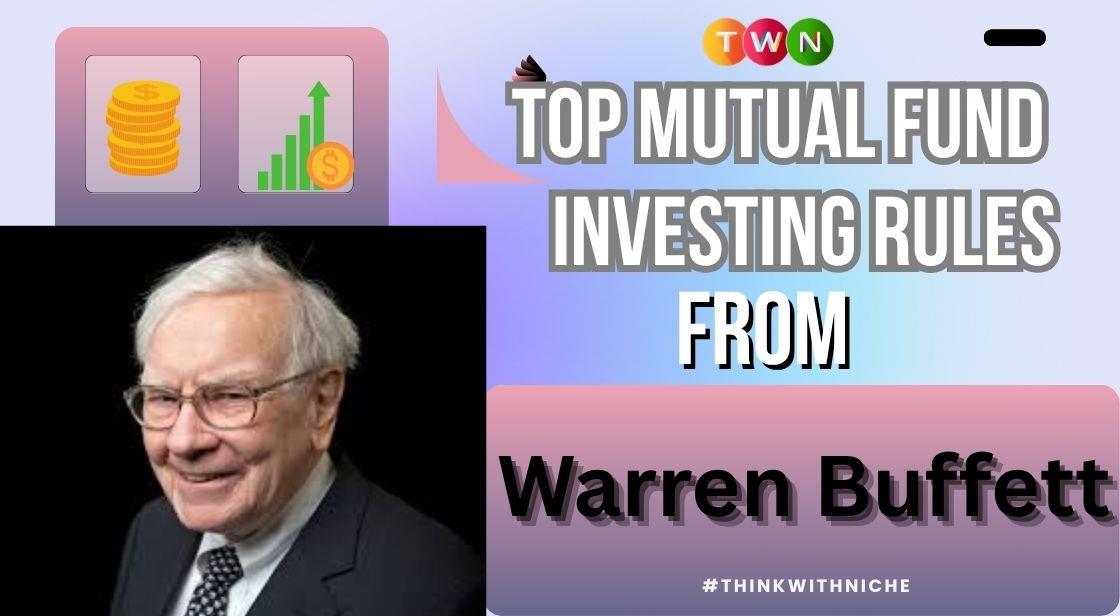Top Mutual Fund Investing Rules from Warren Buffett

Blog Post
When it comes to building long-term wealth through mutual funds, many new investors feel overwhelmed — often believing they need deep market knowledge or expert advice to make the right decisions. But one of the world’s greatest investors, Warren Buffett, thinks otherwise.
Despite never directly investing in mutual funds himself, Buffett’s time-tested principles of value investing, patience, and discipline hold powerful lessons for every mutual fund investor.
In an age where people switch funds based on short-term returns and market chatter, Buffett’s approach reminds us that successful investing is about simplicity, not complexity — and about staying calm when others panic.
This article dives into seven golden rules inspired by Warren Buffett that can help mutual fund investors make smarter, long-term decisions.
Whether you’re just starting out or already on your investment journey, these timeless insights can help you stay focused, reduce costs, and grow your wealth steadily over time.
Follow These 7 Warren Buffett Rules to Master Mutual Fund Investing
Warren Buffett: The Oracle of Omaha
Name: Warren Edward Buffett
Born: August 30, 1930, Omaha, Nebraska, USA
Occupation: Chairman & CEO, Berkshire Hathaway
Net Worth of Warren Buffett (2025): Over $130 billion
Known For: Value investing, philanthropy, long-term investment strategies
Warren Buffett Career Highlights
-
Early Start: Bought his first stock at age 11 and filed taxes at 13.
-
Berkshire Hathaway: Turned a failing textile company into a holding giant with stakes in Coca-Cola, Apple, American Express, and more.
-
Investment Philosophy: Known for "value investing" — buying undervalued companies with strong fundamentals and holding them long-term.
Warren Edward Buffett Investment Principles
-
Buy businesses, not stocks.
-
Invest in what you understand.
-
Avoid unnecessary risks and debt.
-
Be fearful when others are greedy, and greedy when others are fearful.
-
Patience is key — compounding works over decades.
Philanthropy of Warren Buffett
-
Co-founder of The Giving Pledge with Bill Gates.
-
Committed to donating 99% of his wealth to charitable causes.
-
Major donor to the Bill & Melinda Gates Foundation.
Legacy of Warren Buffett
Buffett is widely respected not just for his wealth, but for his humility, frugality (still lives in the same house he bought in 1958), and integrity. He’s often cited as the greatest investor of all time and continues to influence generations of investors and financial thinkers.
Also Read: Know What Makes Bill Gates A Billionaire
Warren Buffett's 7 Timeless Rules for Mutual Fund Investors
Warren Buffett, widely regarded as one of the greatest investors of all time, has never directly invested in mutual funds. Yet, his investment principles and philosophies are immensely valuable for mutual fund investors, especially those new to the world of investing. In an era when investors frequently switch funds or react impulsively to market noise, Buffett's grounded approach emphasizes patience, discipline, and simplicity.
Here is an in-depth breakdown of Warren Buffett's seven golden rules that can guide mutual fund investors toward long-term success.
1. Prefer Low-Cost Index Funds Over High-Fee Active Funds
In a 2016 letter to Berkshire Hathaway shareholders, Warren Buffett criticized the high fees charged by Wall Street fund managers. He argued that these fees often eat into investors' returns and that low-cost index funds are a more sensible option for most people.
"When trillions of dollars are managed by Wall Street folks charging high fees, it will usually be the managers who reap outsized profits, not the clients," Buffett wrote.
What This Means for Indian Investors:
With several low-cost index funds now available in India tracking benchmarks like the Nifty 50 or Sensex, investors have an accessible path to market returns without the high expenses of actively managed funds.
Benefits of Index Funds:
-
Extremely low expense ratios
-
High transparency and simplicity
-
Tax efficiency due to low turnover
-
Long-term returns aligned with market performance
Buffett's Advice: If you find fund selection overwhelming or want to avoid relying on a fund manager's performance, index funds should form a core part of your portfolio.
2. The Ideal Investment Horizon Is Forever
Buffett famously said:
"Only buy something that you’d be perfectly happy to hold if the market shut down for 10 years."
This quote captures the essence of long-term investing. He advocates for selecting quality investments and then letting them grow over time.
Key Lessons for Mutual Fund Investors:
-
Don’t switch funds frequently in response to short-term volatility.
-
Align investments with long-term goals like retirement, child’s education, or wealth building.
-
Stick with quality funds that have a consistent track record.
Buffett's Core Belief: Market fluctuations are natural. Investors who ignore short-term noise and allow time to work its magic are the ones who build sustainable wealth.
3. You Don’t Need to Be a Genius to Invest Successfully
Buffett often downplays the role of intelligence in successful investing. According to him, qualities like emotional control, discipline, and patience are more important than technical knowledge or high IQ.
"Success in investing doesn’t correlate with IQ. What you need is the temperament to control urges that get others into trouble," Buffett has said.
How This Applies to Mutual Fund Investors:
-
Avoid overanalyzing NAV movements or short-term fund rankings.
-
Automate your SIPs and let them run over the long term.
-
Focus on simplicity and consistency rather than complex strategies.
Buffett’s Tip: Stay away from daily market news that can trigger emotional reactions. Instead, invest regularly, stay committed, and let your money grow over time.
4. Be Greedy When Others Are Fearful, and Fearful When Others Are Greedy
This iconic quote from Buffett is especially relevant during times of market volatility.
When markets fall and panic spreads, many investors withdraw or pause their SIPs. But Buffett sees such downturns as opportunities to buy quality investments at lower prices.
Advice for Mutual Fund Investors:
-
Continue SIPs during market downturns. You’ll acquire more units at lower prices.
-
Invest lump sums during corrections if you have spare capital.
-
Avoid herd mentality. Just because others are selling doesn’t mean you should.
Historical Proof: Long-term investors who kept investing during bear markets often saw superior returns when the market recovered.
5. The Biggest Risk Is Not Knowing What You’re Doing
Buffett has said:
"Risk comes from not knowing what you are doing."
Many investors invest based solely on past returns without understanding the underlying strategy or risk profile of the fund.
What Mutual Fund Investors Should Keep in Mind:
-
Understand the category of each fund (large-cap, mid-cap, small-cap, hybrid, sectoral).
-
Know the volatility and risk profile of funds. For example, small-cap and sectoral funds require longer holding periods and are more volatile.
-
Be aware of international fund risks like currency fluctuations and different market cycles.
-
Don’t be misled by short-term outperformance. Last year’s top fund may not lead this year.
Buffett's First Rule of Investing:
"Rule No. 1: Never lose money. Rule No. 2: Never forget Rule No. 1."
Due diligence and understanding your investments is crucial before committing capital.
6. Forecasts Say More About the Forecaster Than the Future
Buffett’s Take on Predictions
Warren Buffett has long expressed skepticism about financial forecasts and market predictions. He believes that most forecasts are more reflective of the person making them than of any actual future event. In his words:
“Forecasts may tell you a great deal about the forecaster; they tell you nothing about the future.”
Why This Matters to Mutual Fund Investors
Many investors are tempted to switch funds or tweak their portfolios based on expert market predictions, short-term fund rankings, or news-driven sentiment. But Buffett warns against making investment decisions based on uncertain projections or short-term outlooks.
Stick to Goals, Not Noise
Instead of chasing returns based on speculation, mutual fund investors should focus on their long-term financial goals like retirement, child’s education, or wealth creation. Investment decisions should be made based on risk tolerance, time horizon, and asset allocation—not market commentary.
Buffett’s Advice in Practice
The market is unpredictable. The smartest strategy is to avoid constant changes, trust in your financial plan, and remain invested for the long term. Let time and consistency be your allies.
7. Discipline and Patience Are Your Greatest Allies
Buffett’s Core Investing Belief
Warren Buffett’s remarkable success is rooted in two traits that often elude investors: discipline and patience. He avoids chasing quick profits or reacting to short-term market noise. Instead, he remains committed to his investment principles, allowing the power of compounding to work over decades.
Lessons for Mutual Fund Investors
Mutual fund investors can take a page from Buffett’s book by focusing on long-term goals and avoiding the temptation to act on every market fluctuation. Monitoring your NAV daily or frequently switching funds can lead to emotional, impulsive decisions that hurt long-term returns.
Stay Invested Through Market Cycles
Buffett encourages investors to maintain Systematic Investment Plans (SIPs) even during market downturns. These periods are not times to pause but to accumulate more units at lower prices—strengthening future gains.
Strategic Rebalancing, Not Reactive Changes
Rather than reacting emotionally, investors should periodically rebalance their portfolio based on their original asset allocation and risk tolerance.
Final Buffett Wisdom:
“The stock market is a device for transferring money from the impatient to the patient.”
Conclusion: Buffett’s Wisdom for Mutual Fund Success
While Warren Buffett may not invest in mutual funds himself, his investment principles are universally relevant. Whether you're a beginner or a seasoned investor, his rules remind us that the path to wealth is not through speculation, market timing, or chasing returns — but through simplicity, discipline, and time-tested patience.
By applying Buffett's rules, mutual fund investors can:
-
Reduce costs
-
Avoid emotional pitfalls
-
Stay focused on long-term goals
-
Build wealth systematically over time
In a world full of noise and uncertainty, Warren Buffett’s teachings offer a calm, rational approach — a compass for anyone navigating the complex world of investments.
You May Like
EDITOR’S CHOICE












